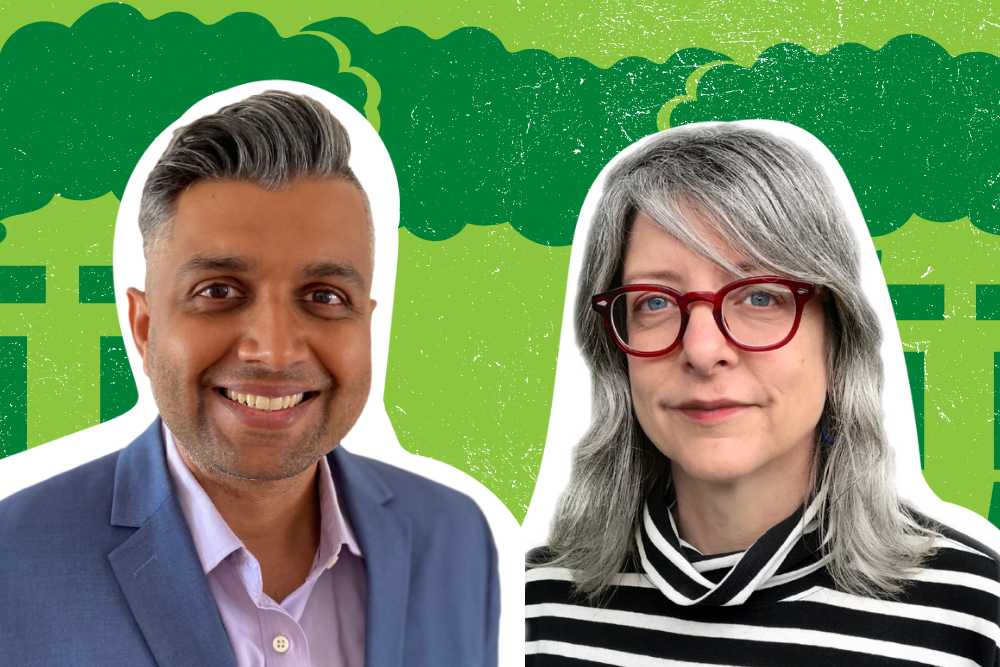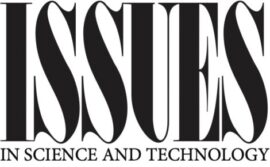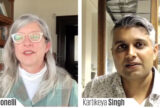
Illustration by Joycelyn Cabrera. From left to right: Kartikeya Singh and Lisa Margonelli.
The struggle to limit carbon emissions often pits sustainable energy against fossil fuels. But does it have to be this way? As Kartikeya Singh writes in a new essay for Issues in Science and Technology, India’s carbon-heavy government ministries have shown a surprising ability to engineer deep change: the nation brought electricity to over half a billion citizens between 2009 and 2019, then presided over a grid where wind and solar became cheaper than power from coal. Could these ministries—which employ 20 million people—transform the country’s energy sector to be ecologically and economically sustainable? Instead of pinning all our hopes on technology, entrepreneurs, and politicians, what can the world accomplish by harnessing fossil fuel bureaucracies for the future?
Kartikeya Singh, senior associate at the Center for Strategic and International Studies, and Issues editor-in-chief Lisa Margonelli visit Zócalo to ask how bureaucracies might embrace obsolescence and reinvent themselves to address today’s most urgent problems.
Zócalo is proud to partner with Issues in Science and Technology, a quarterly journal published by the National Academies of Sciences, Engineering, and Medicine and Arizona State University, to present discussions focused on the intersection of science, technology and public policy.
The Takeaway
Can Bureaucracies Be Sustainability Innovators?
How India’s Coal-Dependent Government Has Harnessed Its Power to Build Better and Cleaner
Bureaucracies are often thought of as stiflers of innovation and growth. But the Indian government, one of the biggest bureaucracies in the world, has made some surprising gains in the …
Past Events in this Series
Meet the ‘Mediators’ Who Connect Scientists and the Public
Fossil Preparators Are a Panacea to a Closed-Off Field—And Their Work Offers a New Model for Research
How do colossal Tyrannosaurus rex and Triceratops fossils get from the ground to the natural history museum? And could that process—which involves not just paleontologists but a largely uncredited group …
Hello Blockchain, Bye-Bye Resumes
Could Digital Learning and Employment Records (LERs) Create a Fairer Hiring Process?
The resume has been around for hundreds of years, and is one of the most vital parts of the hiring process for workers, employers, and educators. But what resumes leave …
Scientists Don’t Have to Be Heroes
How NASA and ASU Astronomer Lindy Elkins-Tanton Is Dismantling the Personality-Driven Culture of the Research Laboratory
Two decades ago, NASA’s Psyche mission principal investigator and ASU Interplanetary Initiative vice president Lindy Elkins-Tanton was working toward her PhD at MIT. It was a place she loved, but …
How Can Inventors Respond to the Real-World Effects of Their Inventions?
A More Holistic Approach to the Field Can Make Technology Better for Society
What is it like to be an inventor? Are inventors responsible for the societal ramifications of their creations? And how could a more holistic approach to innovation lead future scientists …
‘Equating Abundance With Stability’ Is an Existential Threat to the U.S. Food System
Agricultural Scientist Molly Jahn Explains How Our Food Supply Became a National Security Problem
Agricultural scientist Molly Jahn started her career inventing new varieties of squashes and melons. But that work led her to wonder and worry about the security of our global food …
How Will Robot Trucks Change American Life?
For All the Promise of Automotive Trucking, the Future of Our Freight System Has a Human Problem
Robotic trucks are beginning to roll out, carrying cargo and promises of revolutionizing freight hauling, reducing traffic, and lowering pollution. But previous waves of automation have eliminated millions of jobs …












